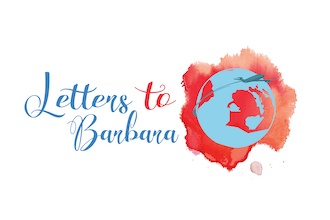Berlinale 2019 Diary
A diary about how my days unfolded during the Berlinale 2019: the movies, the incidents and everything about the festival.
Thursday, 7th of February

Every Berlinale starts at the Red Carpet, and that’s also where the Berlinale 2019 Diary begins.
It’s Thursday night, of course: the Berlinale always starts on the second Thursday of February. Tonight, everything is shiny in front of the Berlinale Palast. Many people stand all around the Red Carpet, waiting for the stars. The opening movie of the 69th Berlinale is The Kindness of Strangers, by Lone Scherfig. The anticipation is high; however, the crowd is smaller than in previous years. The vibe is less lively, too. I can’t forget the uproar at the Red Carpet when the Grand Budapest Hotel opened the Festival in 2014.
I won’t watch a movie tonight. To be honest, I rarely watch a film on the first day of the festival. Usually, I walk around Potsdamer Platz to get the feeling of the festival. As I’ve written in the Berlinale guide, it’s the second Christmas of Berlin. After a short walk, I end up at the Sony Center. There is always a video wall broadcasting live from the interior of the Berlinale Palast. I always like to watch a couple of minutes of the opening Gala.
This is the last year of Dieter Kosslick as a Berlinale director; he has been in charge for 18 years. Anke Engelke, the Berlinale show hostess, is once again on stage. She talks in her typical style, mixing English and German sentences. The show begins with Anke Engelke and Max Raabe singing “We are here because of you,” apparently a tribute to Kosslick, who stands at the theater entrance. Kosslick, with his classic red scarf, stands there slightly inhibited and emotional. The song goes on for two or three minutes, and then there is a standing ovation for Kosslick.
Well, this is definitely the end of an era for the Berlinale.
Friday, 8th of February

I initially wanted to write a few things down on the Berlinale 2019 diary, but it’s sunny outside after ages. Instead of spending time on the laptop, I decided to enjoy the sunshine.
And, of course, I end up at Potsdamer Platz. This afternoon, there is a Red Carpet session, but it’s dead empty. I stop by for twenty minutes, though, and I see the actors and actresses of Systemsprenger. There are no big names in this production, but I read positive reviews about it. I might try to get a ticket for one of the next screenings.
Later on, I queue for the last tickets for System K, and in the end, I get one. This is a movie about the street artists of Kinshasa. It doesn’t get more Berlinale-ish, I guess. The film is decent, presenting many odd characters that try to express themselves through art. But, the most crucial element of the movie is its political statements about the situation in Congo. In African countries, the West is a terrifying concept. This is a hard life, and any form of expression cannot be taken lightly.
The movie is part of the Panorama Documentary section, and I wouldn’t be surprised if it gets an audience award. Actually, the audience awards are always important: they usually go to films with emotion. After the screening, there is also a short Q&A with the director, Renaud Barret. I film a couple of minutes, even if I’m far away from the director (please raise the volume) :
After System K, I rush into the Potsdamer Arkaden. There’s a gap of about 45 minutes before the next film, again at Cinestar, and I must eat something. I, of course, get fish & chips from Nordsee. This has been my Berlinale lunch or dinner for several years in a row. After the end of each Berlinale, I’m always sick of fish and chips, and I don’t eat them for a year. I order one portion: it tastes exactly the same.
And then, I enter Cinestar again. I have a ticket for the Holy Beasts (original title: La Fiera y la fiesta), one of the Panorama movies that I’m really looking forward to watching. The film is about an aging punk diva who arrives in Santo Domingo to direct a musical, an unfinished project of her friend, Jean Louis Jorge. Well, it sounds brilliant, right?
Unfortunately, for the next 90 minutes, I’m irritated, and at times I fall asleep. Honestly, this is one of the worst movies I’ve ever seen in a Berlinale. When I finally exit the cinema, I doubt that this was a Panorama movie -let alone a Berlinale one…
Saturday, 9th of February
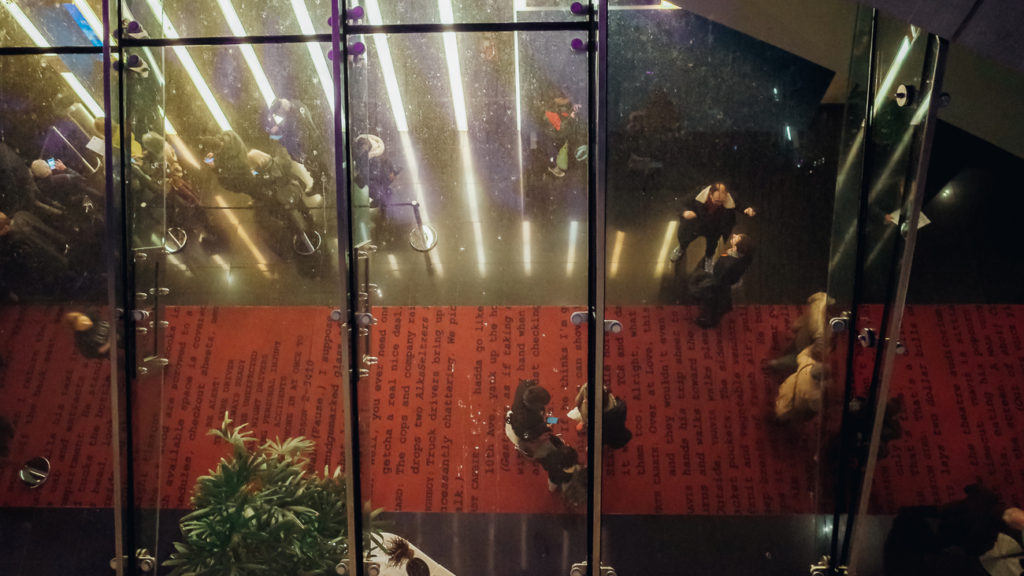
And then, I wake up on a sunny Saturday morning. No tickets booked for today, though: this year, I plan to queue less and go to the Tageskasse instead (searching for tickets straight at the cinemas the day of the screenings).
There are three movies that I’m particularly interested in watching today: Buoyancy, Waiting for the Carnival, and Born in Evin. I arrive though late at Potsdamer Platz, and I miss the chance to watch Buoyancy; therefore, I have just two options. Unfortunately, I can’t watch both of them: one starts at 17:45, the other at 19:00. Consequently, I must choose one -and I go for Born in Evin.
For 90 minutes, I embark on a journey like no other. This is an outstanding existential documentary, and in the end, half of the cinema is in tears while the other half applauds non-stop. The movie follows the quest of a 35-year-old woman in search of her past. Evin is one of Iran’s most notorious prisons for dissidents.
Soon after gaining power, Ayatollah Khomeini sent thousands of political opponents to the prison of Evin, including the filmmaker’s parents. The family that was later able to flee to Germany has never discussed this period of their lives in detail. It seems to be a secret that no one is willing to touch. After years of hesitation, though, the director, Maryam Zaree, finally breaks the silence. How did their trauma inscribe itself in the bodies and souls of the survivors and their children?
I honestly can’t recover from the film. It is intense, tender, and, at the same time, on the verge of tears. My reaction on Twitter is: “Movies like “Born in Evin” are the reason I’m going to film festivals. I doubt I will see such a powerful movie in the rest of the Berlinale, but this existential journey deserves the standing ovation it received. Chapeau!”
Once again, I try to shoot a short clip with my smartphone, but the quality is not optimal. However, I think the videos are a nice addition to the Berlinale 2019 diary, and here is another one.
“We have to go to the Berlinale.”
Despite having the chance to watch another movie (Hellhole), I decided to go back home. Powerful films should be digested and not consumed. All I want tonight is to keep this movie in mind.
It’s almost half an hour ride with the bus back home. Two guys embark after me. They are short, around 45 years old, and drunk. They are Germans, and the alcohol chews their consonants. I observe them constantly, but I try to be discreet. They don’t remove their beanies, and they are constantly nervous. I call them Hamm and Clov, after Beckett’s Endgame characters.
Hamm: After two stops. We have to disembark after two stops.
Clov: Why? We’re in the middle of nowhere. (first time that somebody calls Kreuzberg the middle of nowhere)
Hamm: We have to go to the Berlinale.
Three stops later.
Hamm: After two stops. We have to disembark after two stops. Let’s exit from the front door.
Clov: Why? What shall we do here? I prefer the middle door.
Hamm: We have to go to the Berlinale. The cinema should be around the corner.
Five stops later.
Hamm: We should be close. Probably after two stops. Shit, the middle door is packed. Let’s exit from the front door.
Clov: Why exit? Why now? I don’t like the front door.
Hamm: We have to go to the Berlinale. I hope we didn’t miss the damn cinema stop.
I disembark after almost half an hour. Hamm and Clov keep talking about disembarking, but they always remain on the bus. There is no Berlinale cinema in the proximity. Perhaps they are traveling through the night. But what I know is that if an event makes it to the subconscious of the outcasts, it means that it has already invaded the city’s collective consciousness.
Sunday, 10th of February
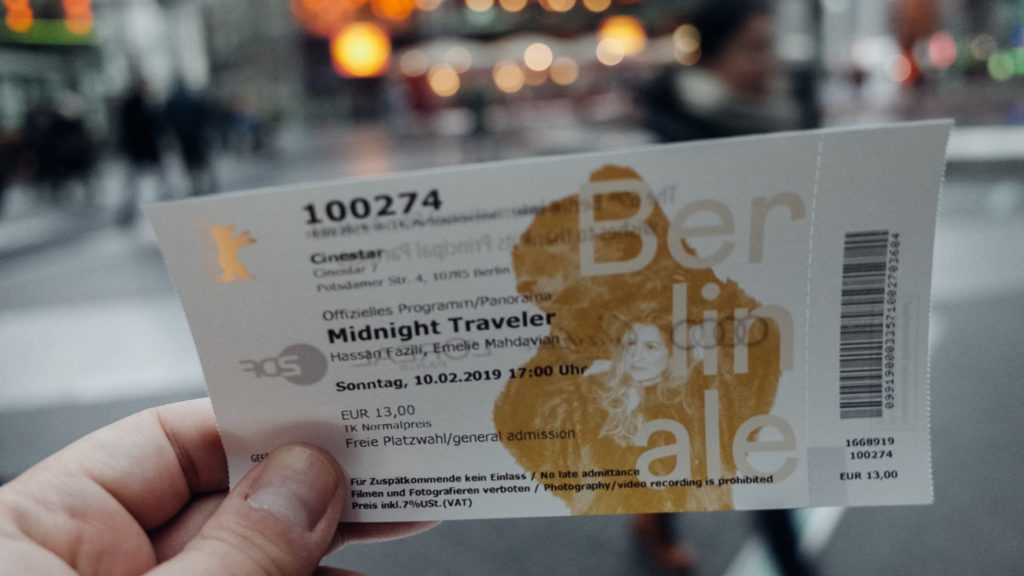
Sundays are for friends, but unfortunately, not all of them are Berlinale fans. I’m afraid that I won’t be able to watch a movie today at all, but I somehow manage to take an Uber on time and arrive at Potsdamer Platz.
As I already mentioned earlier, I decided this year to queue less when the tickets go on sale and try to get my tickets at the Tageskasse. So far, it has worked well, but today, when I arrive at Potsdamer Platz, I’m not that optimistic. I want to watch Midnight Traveler, a Panorama Documentary film, but the queue for the movie is long. I’m at Cinestar almost 70 minutes before the screening, but I already see more than 15 people queuing there. More people are coming, though, and it seems today I won’t watch a movie indeed.
Luckily enough, though, four people decide to leave. Shortly afterward, the man on the counter says: “I have only eleven tickets for the Midnight Traveler.” Everybody starts counting, me too. I’m the eleventh on the row, but the first man in the queue buys two tickets. I stand in the queue, and I wait. The woman in front of me also wants to buy two tickets. But there is only one left. She is disappointed. She then turns towards me and says: “There is one last ticket. Consider it my present for you”.
I thank her, and I buy the last ticket for the European Premiere of Midnight Traveler.
The movie is excellent -it seems that the selection of the documentaries is outstanding this year. It is the story of a family (a couple and their two daughters) that have to leave Afghanistan because the Taliban want to kill them. The family uses three smartphones to document their journey towards Europe. It is a long journey from Asia all the way to Germany, which lasts for almost three years. The footage from their smartphones serves as valuable documentation of their adventure. They have to go through all kinds of misfortunes (racist attacks, hunger), but finally, they arrive in Germany safe and sound.
Only hope keeps them going, and that’s what the director confesses afterward in the Q&A. And then, I have to rush again. The big film festivals, which require attention and dedication, can be stressful if you’re willing to continue having an everyday daily life. Let alone, of course, having to write a Berlinale 2019 diary.
Monday, 11th of February
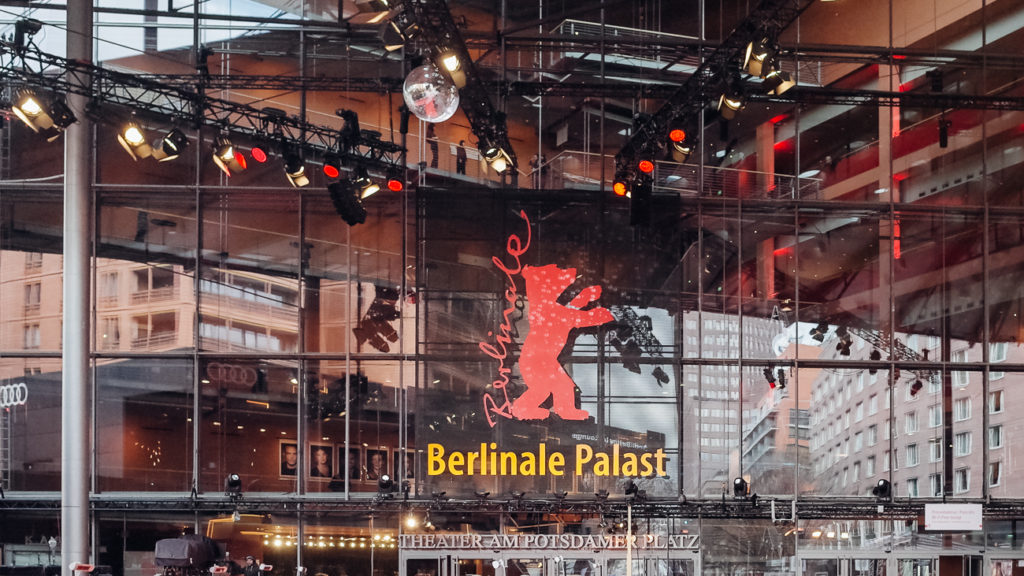
A proper Berlinale 2019 diary includes both a movie marathon and a star.
Unfortunately, it’s not my day. Initially, I wanted to watch a section of the Berlinale Shorts, but it was sold out. One should always have a plan B in film festivals; therefore, after checking the Berlinale app, I decide to rush to Cinestar. There is a world premiere of a Forum movie from Korea, Fukuoka.
I know that the Forum movies are slower, but this is never a drawback. In fact, I have watched excellent films in the past. But not this time. Fukuoka describes itself as “a quietly amusing film about the ability to let go.” While it proves to be true, the cinematography reminds me of an arthouse movie of the 90s. The movie has its moments, but I don’t go crazy.
Later on, I queue for a ticket for Hellhole. I read: “Amidst war and peace, refugee camps and parliamentary debates, a group of lost souls drifts through the sharpness and fuzziness of life.” It’s been from day one on my list, and it’s presented tonight at the IMAX screen also at Cinestar. Despite being a Panorama movie, it seems to be more of a Forum one. The cinematography is impressive, although sometimes too academic for my taste. But the main problem is the plot: it’s almost nonexistent. After nearly 90 minutes, I leave the Cinestar IMAX confused.
The last movie of the day is watchable but nothing to go crazy about once again. Heute oder morgen is a movie about three young guys that drift endlessly in Berlin. It’s okay to watch, but I sometimes feel a bit irritated because I think that I watch a movie about cool people living in a cool city where a cool film festival takes place.
The star of the Berlinale 2019
After watching Fukuoka, I rush to the Red Carpet. There is a Red Carpet session for Vice, and Christian Bale is there. Ever since watching Equilibrium, I have followed Bale’s movies. The last time he attended the Berlinale, I wasn’t close at all, so hopefully, I will manage to be closer tonight.
But as I stated earlier, this is not my day. When I arrive at the Red Carpet, Christian Bale is already there, and he’s talking to the press. Sure, I can see him, but I’m so far away that all I see is a hand greeting a screaming audience. Next time…
My interview on the German radio
Earlier this week, I talked on the German radio about the Berlinale. Jakob Bauer from the rbb read my Berlinale guide and asked me to share some extra insights about the Berlinale and also my thoughts about the future of the festival. Herzlichen Dank, Jakob!
Tuesday, 12th of February
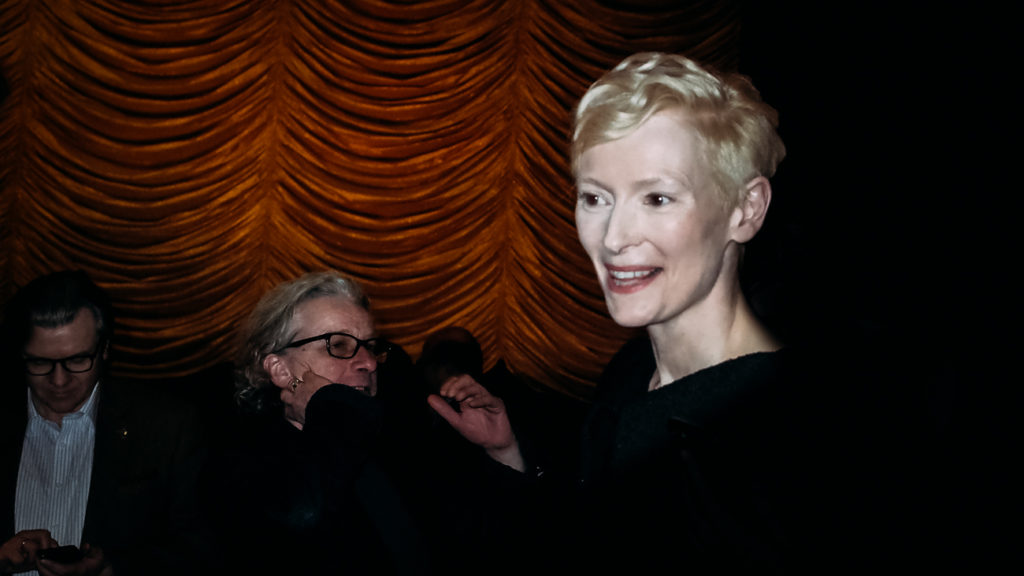
I’ve seen her before, but nothing compares to tonight.
Tilda Swinton is in Berlin for the Berlinale premiere of The Souvenir. The Zoo Palast is packed for the screening, and everybody is waiting for Tilda Swinton to appear. And indeed, she appears shortly past 21:30, dressed in black. She looks more like a rockstar and less like an actress. She is elegant but yet very humble. The crowd applauds cheerfully, but Tilda Swinton walks humbly. Next to her walks her daughter, Honor Swinton Byrne, sitting together in the reserved seats.
The director of The Souvenir, Joanna Hogg, goes on stage before the screening for a short presentation of the movie. She also talks about Tilda Swinton; they have known each other for several years. The crowd is cheering again, and Swinton is cheering, too. Then, the lights go off, and the Berlinale music plays.
After five minutes into the movie, Tilda Swinton, pretty much like every big movie star, leaves her seat. She walks out of the cinema hunched, with quick steps like a small deer. She will most likely wait somewhere outside. I’m sitting less than three meters away, and I can even smell her perfume. Then, she closes the door behind, and I try to focus on the movie.
The Souvenir follows the affair of Julie (Honor Swinton Byrne) and Anthony (Tom Burke). Julie uses her camera to understand the world. She is well aware of her privileged social position, and her camera seems to be the only way to break out of her own bubble. However, Anthony comes into her life, bringing a secret that will soon destroy everything. The movie is good, and Tilda Swinton plays Julie’s mother. It’s a typical Berlinale Panorama movie, and such movies are always enjoyable.
Two minutes before the end, Tilda Swinton re-enters the cinema in the exact way she left: like a small deer. She takes a seat, and when the lights go on, she starts cheering again. And then, she walks to the stage. There is a short presentation of the whole cast, and a couple of minutes after it finishes, Tilda Swinton is already among the crowd, signing autographs. I walk close to her, and I ask her for a photo. I take a couple of shots, and then I step back to observe her interaction with the people.
A guy asks her for a selfie; she doesn’t deny of course. However, the guy is very enthusiastic, and he throws his bag in a nearby seat. There is a pair of glasses there. Tilda Swinton says calmly: “Please be careful; we don’t want to break the lady’s glasses.” I know that I have to write this one down in the Berlinale 2019 diary.
I leave the Zoo Palast behind. It’s drizzling. I smoke a cigarette, and meanwhile, I check the photos. I have a couple of good ones. I’ll keep one or two of them on my hard drive, and the rest I will upload on the Berlinale 2019 diary and social media.
Wednesday, 13th of February
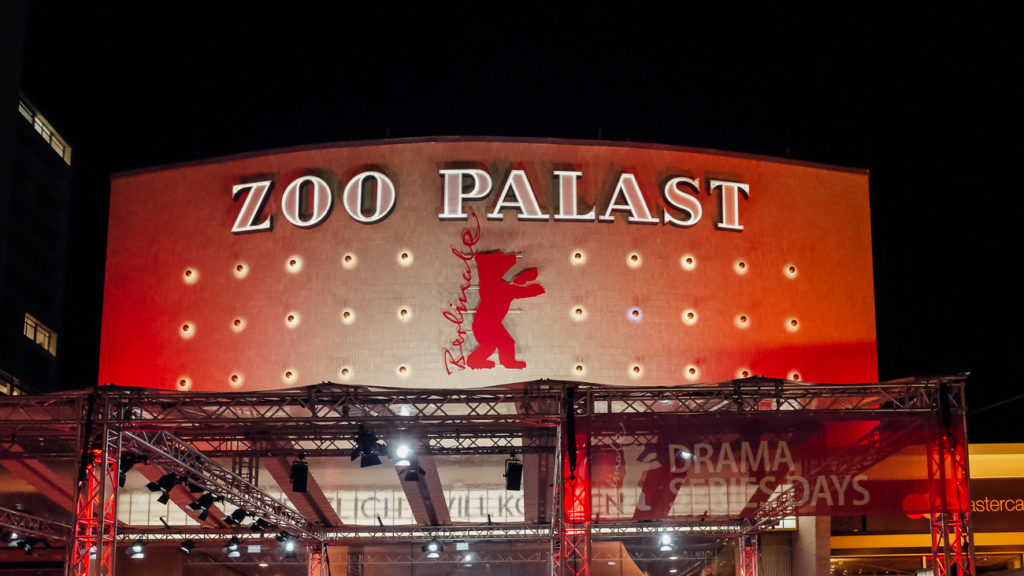
Some days the Berlinale is not about the movies.
I started the Berlinale 2019 diary because I also wanted to highlight how the festival affects the city. Today, while walking around Neukölln, I thought of stopping for a cigarette. This is a habit of mine when I want to take a break and observe what’s going on around me. On the other side of the street, somebody was walking clumsily, and he kicked accidentally a parked bike. Such things happen, of course. But the man didn’t pay attention, and he continued walking as if nothing had happened.
A few meters away, another man was walking, holding his daughter’s hand. He saw the incident with the bike. Then, he changed his route and walked towards the bike. He lifted it and parked it in its proper position.
I wouldn’t mention the story as part of the Berlinale 2019 diary if I were not convinced that this man was Hassan Fazili, the director. A couple of days ago, I watched his movie, Midnight Traveler, at the Berlinale. I remember his face when he came on stage to talk about his film, about his family’s odyssey from Afghanistan all the way to Germany. I’m 99% sure that it was him today -I leave 1% of a doubt just in case I’m wrong.
Having watched this movie, I stood at this spot in Neukölln and thought if we really need an odyssey to become more human. If I weren’t in the cinema that day, I wouldn’t even remember the incident, let alone write about it. I’m not preaching about morality here. But seeing Hassan Fazili walking down the street with his daughter, lifting that bike, was more critical than any Berlinale movie that I watched today. It’s not the incident itself; it’s the symbolism.
I hope that Germany treats him and his family well.
Thursday, 14th of February
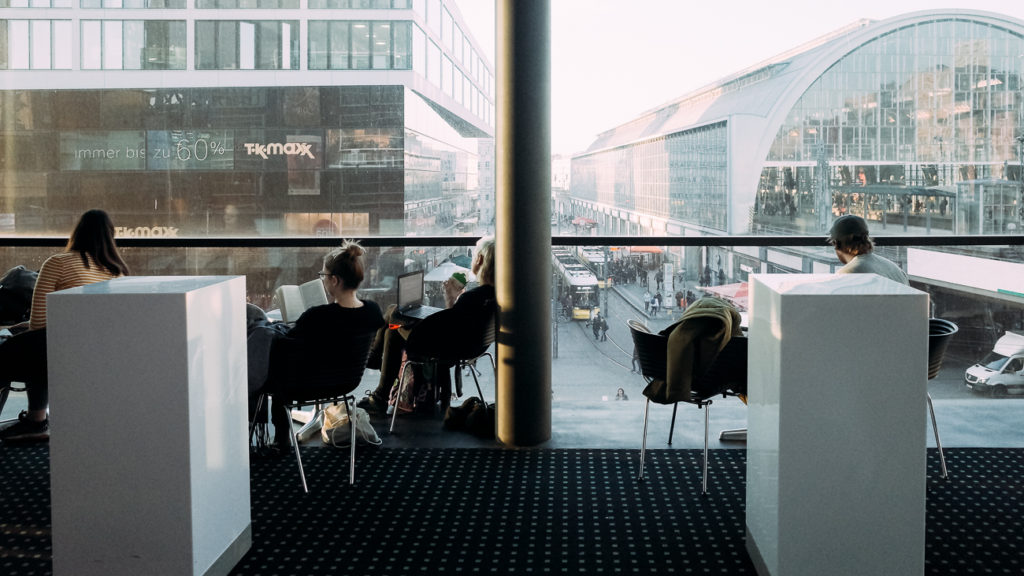
Valentine’s Day always falls during the Berlinale, and I’m so used to seeing every 14th of February half of the city wearing Berlinale badges and the other half carrying flowers.
Today, I find myself walking around Alexanderplatz, taking photos of people, and enjoying the sudden sunshine. It feels like the first day of spring. The Alexanderplatz is not my favorite place in Berlin, but there is a Berlinale movie at Cubix that I’d like to watch. It is a Panorama documentary movie called Searching Eva, and I’m rather curious to watch it. Once again, I go to the Tageskasse, and I buy my ticket there almost an hour before the screening. All these days, I keep asking the employees how many tickets they really sell the last hour before the movies. The reply always varies: between 10 and 25.
I am among the first to enter the cinema. This gives me always the opportunity to observe the human geography of the audience. Today there are mainly women attending Searching Eva. However, a quarter of an hour before the screening, two men start to argue. This is definitely an incident for the Berlinale 2019 diary, I say to myself, and then the two guys have my attention.
One of them has apparently attended the previous screening in the same cinema and has left his jacket on his seat to reserve it for the next screening. However, some other guy doesn’t really pay attention to the jacket and occupies the seat. Whatever follows is a typical German quarrel about to whom the seat belongs.
They end up screaming, and a Berlinale employee has to play the referee. She says that it’s not allowed to occupy seats for the next screening, period. I’m used to the seat-quarrels after all these years in Germany, but I’m still surprised that there is a rule for everything, even to whom a seat with a jacket belongs.
Even if it’s all theater, I’m here for the movie. Searching Eva follows the story of a young girl who shares all her life on social media. She has left Italy, her home country, due to a problematic relationship with her parents (i.e., oppression) and defines herself as a sex worker. Her name is Eva, and she currently lives in Berlin, changing flats all the time. This is a profoundly feminist movie, and Eva’s message seems to be the celebration of her own body. This is a genuinely welcome message, very Berlinale-ish too, and for 90 minutes, the movie also follows Eva’s interaction with her social media followers.
There are still images of Eva’s naked body; there are internal monologues that resemble diary entries. Eva’s thoughts occupy a good part of the movie. This is an exciting documentary that captures pretty well the zeitgeist of Berlin as well as the mindset of several of its younger inhabitants. The only drawback for me is that Eva’s character seems to be relatively flat, and the persona that she incarnates is very narcissistic.
After the screening, Eva and the movie crew appear on stage. She replies to a few questions, but I can’t say for sure if she is playing herself in the movie or not from these five minutes. To be honest, it is also unfair to judge someone’s personality and compare it to a persona, even from a documentary, from a short Q&A. But any controversy caused is always welcome, and Searching Eva accurately captures the spirit of the ’10s in Berlin.
Friday, 15th of February
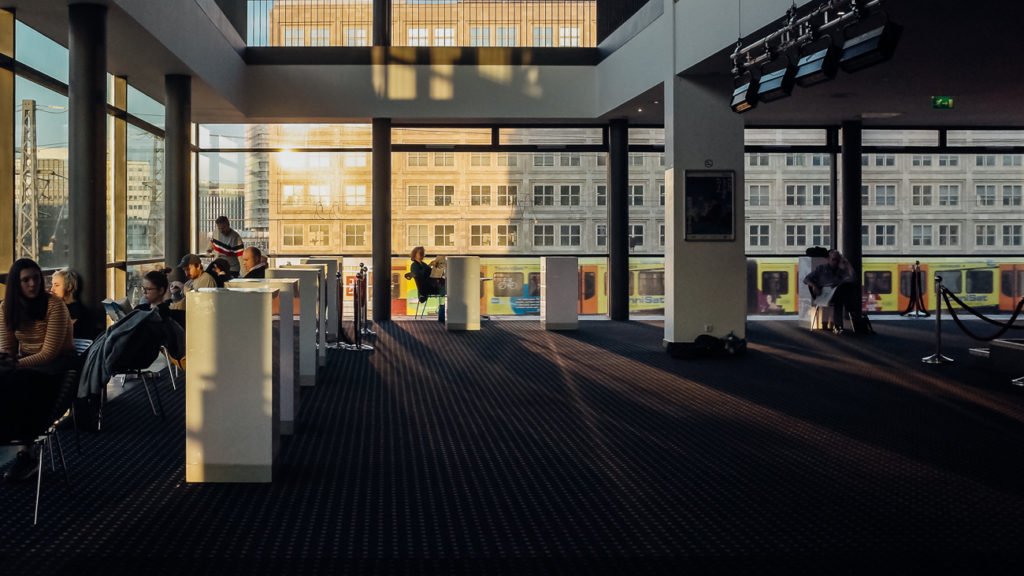
Writing the Berlinale 2019 diary is challenging.
Every night I return exhausted from the cinemas, and I sit down to write. But tonight, it’s one of these nights that justify my decision to attend the Berlinale faithfully for the last decade. One of the movies makes me somehow optimistic about the cinema’s future. It also restores my faith in humanity and assures me that not everything is lost.
Shooting the Mafia is part of the Panorama Documentary, and it’s one of the most influential movies I’ve seen in a long time. It’s different from Born in Evin, which I also really liked. But here, the viewer follows the life of an unconventional woman, Letizia Battaglia, who took photos of the murdered Mafia members for over a decade. This is a purely political movie. Letizia Battaglia is an Italian photographer who didn’t study photography; she started shooting photos at the age of 40. And what a photographer she is!
Battaglia married very early in life as a teenager and soon realized that her wedding didn’t make her happy at all. After several years into this unhappy marriage, she was hospitalized in Switzerland with a nervous breakdown. However, when she finally split up with her husband, she felt liberated. After that, she decided to spend her life with younger lovers, and that’s how she still lives, at the age of 83.
Oppression seemed to motivate her somehow. Born in Palermo, Battaglia never left her hometown behind. She stayed there to struggle and her life, according to her, was always a hassle. Finally, at the age of 40, she took a camera in hand and started working as a photographer in the local newspaper. Palermo was always the lair of the Italian Mafia, and for 19 years, she would shoot photos from the murders of the Mafia. Her images are outstanding, and her view is always clear. The compositions are really one of a kind. To me, she seems to be a morbid Vivian Maier.
The fight against the Mafia seemed to be a lost one. After almost two decades following the Italian Mafia, Battaglia decided to switch to politics. For nearly ten years, she was part of the Greens. However, today, she feels disappointed. She was there when Falcone was murdered, and she was there when Borsellino was assassinated. Letizia Battaglia left politics, saying, “she got very well paid for doing nothing.”
The movie is an elegy for photography, Battaglia’s generation, and southern Italy. It’s unfair to compare it to Searching Eva, which I watched yesterday, but I would love to see this sort of background in Eva’s character. Shooting the Mafia is a stunning documentary about the life of a great woman combined with modern Italian history. Creating such a multi-layered movie with only one character is a huge achievement. Chapeau!
After the screening, there was a short Q&A, in which the director talked about this project. If you watch only one of my Berlinale videos, make sure to watch this one. The director talks during the last 3 minutes of the clip.
Saturday, 16th of February
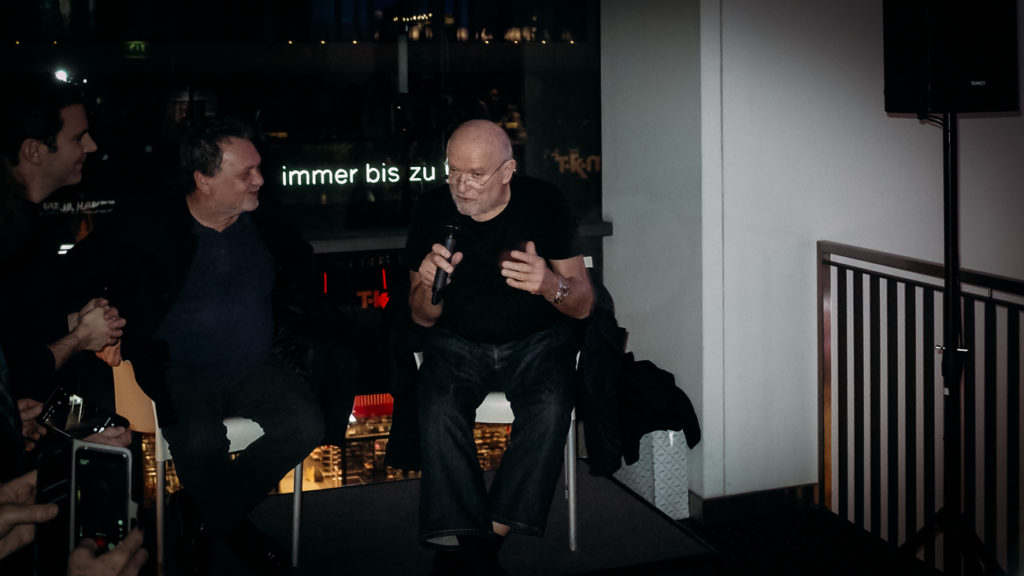
Today, it’s all about cinema and photography in the Berlinale 2019 diary.
I arrive at Alexanderplatz one hour before the screening of “Peter Lindbergh: Women’s Stories.” I tried watching the movie yesterday but was too late to get the tickets. It’s a sunny day once again in Berlin, and I decide to spend the biggest part of the day outside. I walk, drink a coffee, and sit on benches to catch some sunshine. It’s so easy to get depressed and weak this time of the year, and I sometimes take vitamin D to cope with the weather. Or, I watch Berlinale all the time.
But at 6 o’clock I’m already sitting in the cinema. The documentary about Peter Lindbergh is about to start. To my surprise, the guys from the Berlinale announced that Peter Lindbergh would attend the Q&A after the screening. The audience applauds. And then, the movie starts.
It’s a documentary about Lindbergh’s life and his relationship with women: from his wives to his sister and from supermodels like Naomi Campbell to crew members. Peter Lindbergh seems to be a cool guy, always in a good mood and enjoying what he does.
However, some bleak moments from his past are not presented: either the director decided not to go deeper, or Lindbergh himself preferred to remain silent. When I write about the bleak moments, I mean specifically his father’s appreciation of the Nazi regime. Lindbergh, of course, disagrees with his views, but I have the feeling that this is a missing part of the film.
Ten minutes before the movie’s end, I see Peter Lindbergh entering the cinema. He strolls and takes a seat among the audience. I have mixed feelings about the film itself. It seems that it’s dedicated to the amazing life of this fantastic photographer, but it misses the elements that made him the man he is today. I would like to see more of his struggle (it seems that there wasn’t any) and more of his thoughts about life and photography. I’m aware that the movie’s name is Women’s Stories, however, this is a two-hour documentary, and it had lots of space for reflection.
Shortly afterward, the movie is over, and the lights turn on. We are informed that the Q&A will take place in the cinema’s lobby, and five minutes later, the audience surrounds two empty chairs. A minute later, the seats are occupied by Peter Lindbergh and the director of the movie, Jean Michel Vecchiet. Although I don’t have a proper camera with me, I capture five minutes of footage from the Q&A. In the clip that you’ll watch below, Peter Lindbergh replies to two questions from the audience: a) How to be a great photographer and b) If he fulfilled all of his dreams as an artist.
Sunday, 17th of February
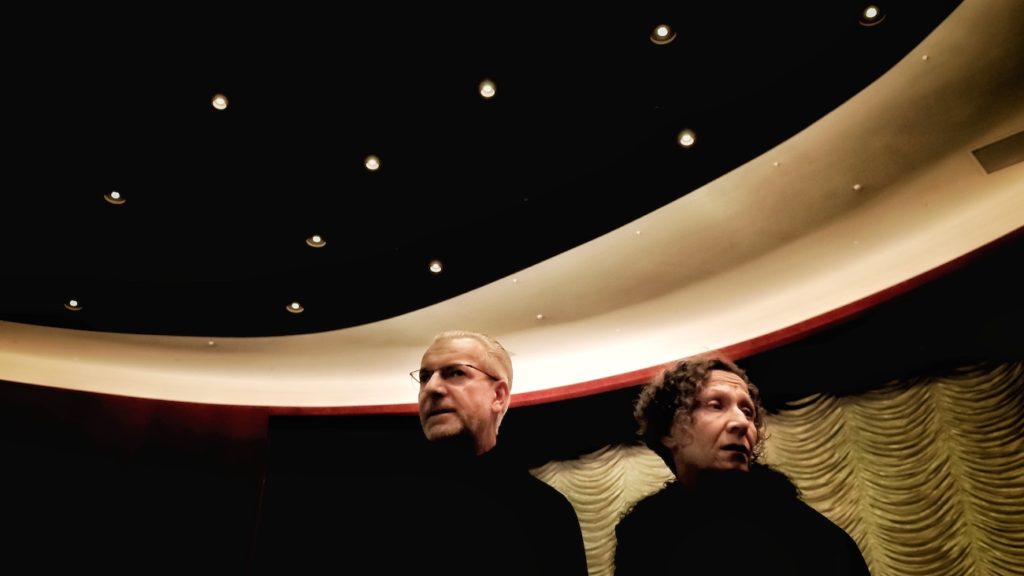
This is the last day of the Berlinale, and it’s called Kinotag. It practically means that the tickets are a bit cheaper (but not significantly cheaper like in former times). There is a certain melancholy in the air: the festival is coming to an end, the directors and actors are not in Berlin anymore, and usually, there is still abundant winter ahead. It’s more of a Berlinale blues day, to be honest.
I’m never announcing personal awards -this is what the Jury does, and it does it well. As I’ve written in the guide, for me the Berlinale is not a competition, but a way to celebrate our love for cinema. Therefore, the movies I will watch today won’t change my mind.
As always, today’s movies will be the audience awards for the Best Panorama Feature film and the Best Documentary. I might even try to get a ticket for the Award Winning Shorts, although lately, I haven’t followed this section very closely because it has disappointed me for the last couple of years. But maybe it’s a good chance to restore my faith in the Berlinale Shorts.
I’m writing this final entry to the Berlinale 2019 diary before the screenings to write down a few thoughts about this year’s festival. After watching twenty movies in total, I can say that it was not a good year for feature films. There might have been very good movies I didn’t watch, but from the ones that I attended in the past, there were always a couple of brilliant ones. This year though there was no Margin Call, there was no Upstream Color, not even something like Shepherds and Butchers.
On the other hand, the Berlinale 2019 was a fantastic festival for documentaries. I found the documentaries to be excellent, and some of them are among the best I’ve ever watched. Shooting the Mafia, Born in Evin, and Midnight Traveler are movies I will be thinking about for a long time. I firmly believe that the documentary section(s) is actually the one that always gives depth and substance to every film festival. This year’s selection was outstanding.
Last but not least, I have to highlight that in this year’s Berlinale, the women stole the show. It’s not only that almost half of the directors were women, but it’s also that the best movies I’ve watched were about women, too. Faithful to its vision, the Berlinale achieved something big this year. One can only hope that the new director of the Berlinale will continue on Dieter Kosslick’s track.
Thank you
Before the Berlinale 2019 diary becomes part of the history of this blog, I would like to thank all of you for following and reading my entries daily. Your likes and shares all over social media motivated me to write this long (more than 5,300 words) diary.
I hope you enjoyed reading it as much as I enjoyed attending the Berlinale. Feel free to share whatever you like about the Berlinale 2019 in the comments below.
The Ultimate Berlinale Guide, The best Berlinale Hotels & My Diary from the 2020 edition of the Berlinale
Pin it for later
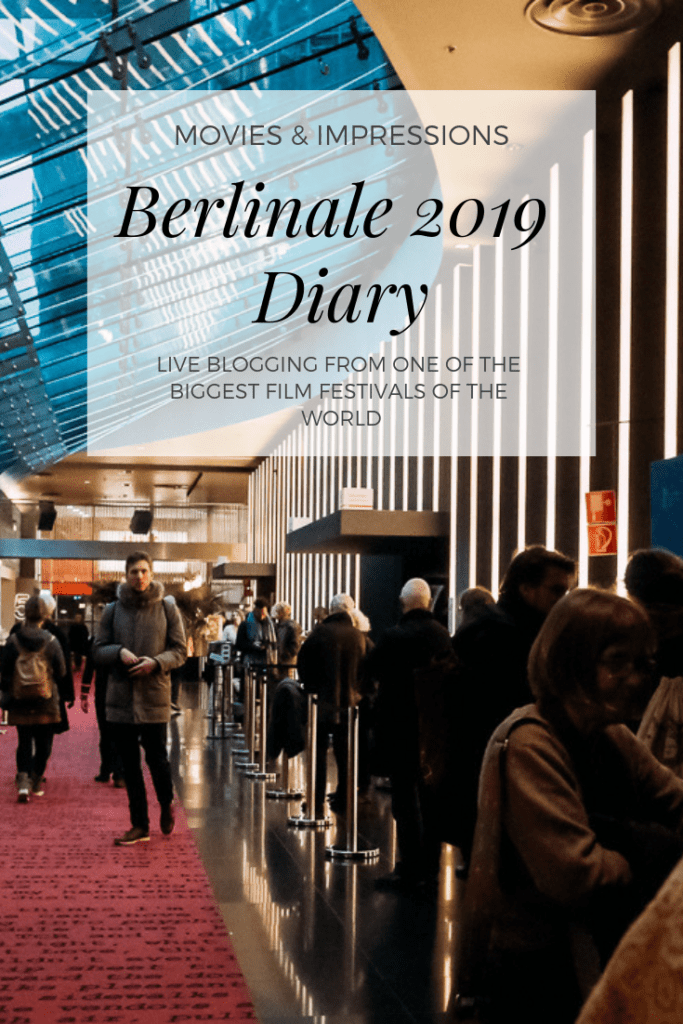
Sharing is caring: Please share the Berlinale 2019 Diary with your friends on Social Media.
